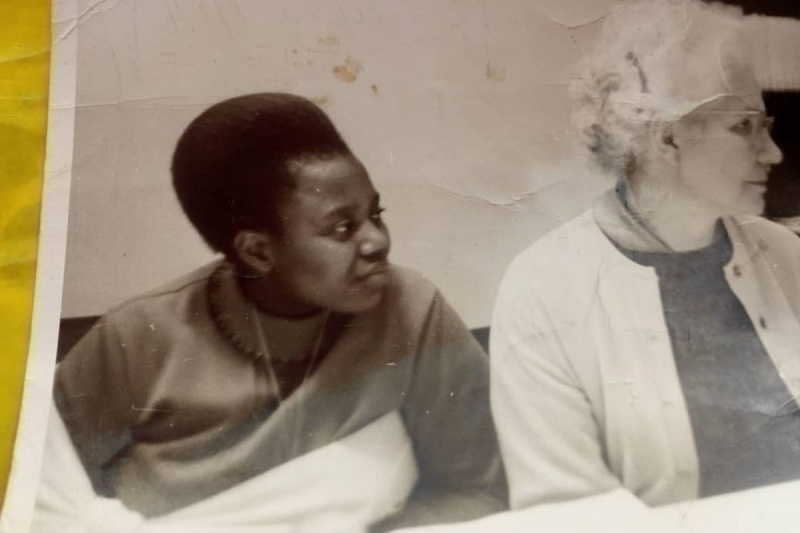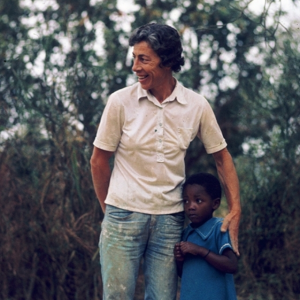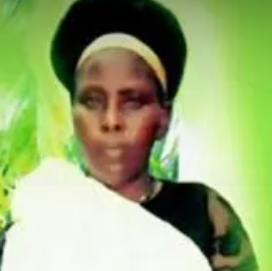In 1994 Félicité Niyitegeka directed the Centre Saint-Pierre, a Catholic missionary institute based in Gisenyi, a quiet frontier town overlooking the Lake Kivu.
Born in 1934 into a Hutu family, Félicité was nicknamed by her parents "ikimanuka", to indicate her friendly and honest personality. Always available to help people in need and to mediate disputes, she decided to remain unmarried and to devote herself to the service of others. In the 1950s she joined the Auxiliaries of the Apostolate, a lay order that in Rwanda included both Hutu and Tutsi members. After obtaining a teaching certificate and receiving further religious training in Lourdes, France, she began to direct the Centre Saint-Pierre in Gisenyi, a holiday resort where the citizens of Kigali went to in order to escape the worries of everyday life.
In the town on the border with the former Zaire, the specter of genocide revealed itself during the second week of April 1994. The stories of violence and oppression, coming from the rest of the country, worried Félicité, who could barely sleep and who told a friend - well before the massacres - "I foresee an imminent danger".
When the extermination squads began to express their genocidal fury, Niyitegeka was conducting a spiritual retreat at the Centre Saint-Pierre, in which Hutu-Tutsi distinctions were never an issue. Thus, Niyitegeka decided to keep the Tutsi participants at the retreat in the Centre, being aware that obliging them to return home meant to condemn them to death. At his urging, other Tutsis living near the centre joined them, too.
Since the militia was reaching Gisenyi, Félicité realized that the center was no longer a safe place. So she decided to lead the people at the retreat across the border with the Republic of the Congo, then Zaire. After all, the centre was only a kilometre away from the border.
Thus, Niyitegeka called his contacts across the border, organizing a temporary shelter for her Tutsi guests. She knew well the soldiers patrolling the border area, therefore she decided to bribe them to turn away during the passage of Tutsis.
Helped by Adria Umurangamirwa, a Tutsi living in the center, around 2 am on April 19,1994 Niyitegeka was managing to organize the escape of ten to fifteen people across the border. The refugees gathered in the chapel, where they were blessed by Niyitegeka and a priest. Then they left from the back of the Centre through a small service door and, escorted by Adria, crossed a path surrounded by thick bushes, anxious that someone was lurking in the dark. They eventually made it to the Hôtel des Grands Lacs in Muzizi, Zaire.
Enthusiastic about the success of the first expedition, in the afternoon of the 21st of April, Niyitegeka managed to organize the escape of another group of refugees. At that very moment, she saw a militia squad arriving, which, in a disorderly manner, brandishing guns, grenades and machetes, tried to enter the courtyard of the Centre Saint-Pierre.
Unfortunately, they managed to enter. Once inside, they ordered to Félicité to deliver them the refugees, who they defined "cockroaches", as the militias called the compatriots of Tutsi origin. Félicité Niyitegeka refused to cooperate, claiming that the refugees were their brothers and sisters.
The militia loaded the refugees on the buses anyway, inviting Félicité to step aside. The director of the center was "protected" by her brother Alphonse Nzungize, colonel of the Hutu army. Even before the arrival of the militia, Nzungize begged his sister to leave the Centre Saint-Pierre, but Niyitegeka declined. "I would rather die,” she wrote in a letter to his brother, "than abandon the 43 people I am responsible for".
Félicité boarded on one of the buses together with the people who she was guarding and she was taken with them to the Commune Rouge, a cemetery, an area turned into an extermination camp. The murderers ordered everyone out of the byuses. Niyitegeka prayed for her fellow travelers and invited them not to be afraid. Then, she was shot and killed, along with the Tutsis she protected.
Eric Murangwa, genocide survivor against the Tutsis and co-founder of the Ishami Foundation, told the Atlas Oscura magazine that Félicité had such incredible strength to put herself in a position to say: "The best I can offer these people is actually to be with them, whatever is going on".














